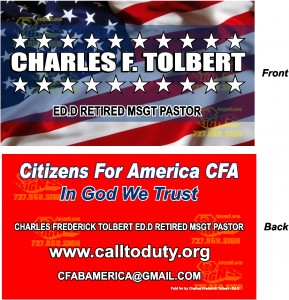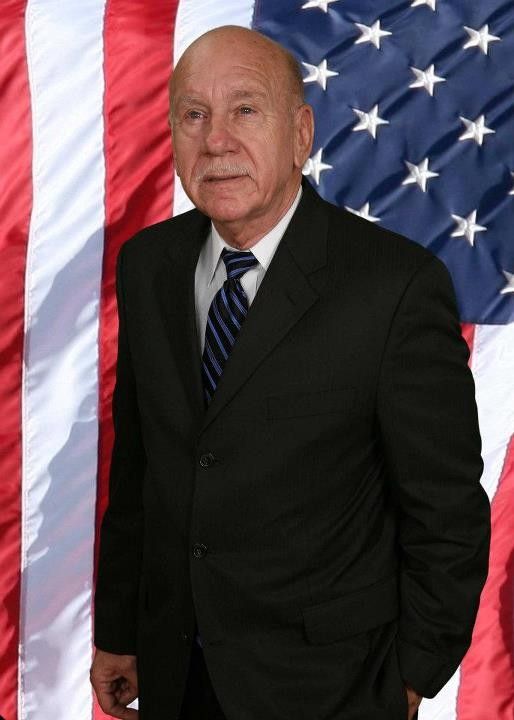Florida Election Commission (FEC)
107 W. Gaines Str, Ste 224
Collins Blg
Tallahassee, Fl. 32399
Division of Elections (DOE)
Room 316, R.A. Gray Building
500 South Bronough Street
Tallahassee, Fl 32399-0250
CFABA
Charles Frederick Tolbert EdD
Retired MSGT/Pastor
Ref: case no.: FEC 14-494; Respondent: Charles Frederick Tolbert
P O Box 740025
Orange City Fl. 32774
561-398-9025
cfabamerica@gmail.com
To whom it may concern:
In reference to letters dated Feb. 02, 2016 from FEC and letter dated Jan. 27, 2016 from DOE.
Please note at Charles Frederick Tolbert sent both the FEC and the DOE priority mail letters addressing the complaint (case no.: FEC 14-494) and present the address change to:
CFABA
Charles Frederick Tolbert EdD
Retired MSGT/Pastor
Ref: case no.: FEC 14-484; Respondent: Charles Frederick Tolbert
P O Box 740025
Orange City Fl. 32774
561-398-9025
cfabamerica@gmail.com
I again like to note that my treasurer Ms. Hagendorf believes that she filed all reports in a timely manner, in addition we sent copies in previous correspondences confirming this.
Ms. Hagendorf was also faced with medical issues during the time she was the treasurer.
Dr Charles Frederick Tolbert is a retired MSGT, Pastor and was a care giver for three women during the campaign period in addition he filed chapter seven and became homeless during 2014 time period.
Also he did not receive donation either from his ministry or for campaign in 2014.
Due to these unusual circumstance knowing that I had no intent to not file reports as required that if determined that I was in error that any fines be waived and that I be allowed five minutes to present my side.
Currently I have and income of only
my military retirement, VA and SS.
Also note that since this PO Box was only checked once a month bases the failure of DOE and the FEC has again provide that they have unclean hands.
I have on Feb 11, 2016 received notice of hearing for Feb. 18, 2016 at 8:30 am and I request that I be allowed to present documents that were provide in my correspondence on Dec. 15, 2016. Furthermore I requested a responds with in fourteen days and only after two months did I receive a responds.
I also request that my case be heard by my peers as per the US Constitution and that the State of Florida provide me a public attorney.
Charles Frederick Tolbert EdD
CFABS inc
PO Box 740025
Orange City Fl. 32771
Feb 13, 2016
Amendment to the United States Constitution
These are the constitutional violations committed by the division of elections and the Florida election commission Charles Frederick Tolbert for candidate running for office in Florida
The Fifth Amendment (Amendment V) to the United States Constitution is part of the Bill of Rights and protects a person against being compelled to be a witness against himself or herself in a criminal case. “Pleading the Fifth” is a colloquial term for invoking the privilegethat allows a witness to decline to answer questions where the answers might incriminate him or her, and generally without having to suffer a penalty for asserting the privilege. A defendant cannot be compelled to become a witness at his or her own trial. If, however, he or she should choose to testify, he or she is not entitled to the privilege, and inferences can be drawn from a refusal to answer a question during cross-examination. The Amendment requires that felonies be tried only upon indictment by a grand jury. Federal grand juries can force people to take the witness stand, but defendants in those proceedings have Fifth Amendment privilege until they choose to answer any question. To claim the privilege for failure to answer when being interviewed by police, the interviewee must have explicitly invoked their constitutional right when declining to answer questions.
The Amendment’s Double Jeopardy Clauseprovides the right to be tried only once in federal court for the same offense. The Amendment also has a Due Process Clause(similar to the one in the 14th Amendment) as well as an implied equal protection requirement(Bolling v. Sharpe). Finally, the Amendment requires that the power of eminent domain be coupled with “just compensation” for those whose property is taken.
Sixth Amendment to the United States Constitution
Changes must be reviewed before being displayed on this page.
The Sixth Amendment (Amendment VI) to the United States Constitution is the part of the United States Bill of Rights that sets forth rights related to criminal prosecutions. The Supreme Court has applied the protections of this amendment to the states through the Due Process Clause of the Fourteenth Amendment.
Edit
Watch this page
Seventh Amendment to the United States Constitution
The Seventh Amendment (Amendment VII) to the United States Constitution is part of the Bill of Rights. This amendment codifies the right to a jury trial in certain civil cases, and inhibits courts from overturning a jury’s findings of fact.
An early version of the Seventh Amendment was introduced in Congress in 1789 by James Madison, along with the other amendments, in response to Anti-Federalist objections to the new Constitution. Congress proposed a revised version of the Seventh Amendment to the states on September 28, 1789, and by December 15, 1791, the necessary three-quarters of the states had ratified it. Secretary of State Thomas Jefferson announced the adoption of the amendment on March 1, 1792.
The Seventh Amendment is generally considered one of the more straightforward amendments of the Bill of Rights. While the Seventh Amendment’s provision for jury trials in civil cases has never been incorporated (i.e., applied to the states) almost every state voluntarily complies with this requirement. The prohibition of overturning a jury’s findings of fact applies to federal cases, state cases involving federal law, and to review of state cases by federal courts.[1] United States v. Wonson (1812) established the “historical test”, which interpreted the amendment as relying on English common law to determine whether a jury trial was necessary in a civil suit. The amendment thus does not guarantee trial by jury in cases under maritime law, in lawsuits against the government itself, and for many parts of patent claims. In all other cases, the jury can be waived by consent of the parties.
The amendment additionally guarantees a minimum of six members for a jury in a civil trial. The amendment’s twenty dollar threshold has not been the subject of much scholarly or judicial writing; that threshold remains applicable despite the inflation that has occurred since the 18th century.
The Eighth Amendment (Amendment VIII) to the United States Constitution is the part of the United States Bill of Rights (ratified December 15, 1791[1]) prohibiting the federal governmentfrom imposing excessive bail, excessive fines, or cruel and unusual punishment. The U.S. Supreme Court has ruled that this amendment’s Cruel and Unusual Punishment Clause also applies to the states. The phrases in this amendment originated in the English Bill of Rights of 1689.
The Ninth Amendment (Amendment IX) to the United States Constitution addresses rights, retained by the people, that are not specifically enumerated in the Constitution. It is part of the Bill of Rights.
The Tenth Amendment (Amendment X) to the United States Constitution, which is part of the Bill of Rights, was ratified on December 15, 1791.[1] It expresses the principle of federalism, which strictly supports the entire plan of the original Constitution for the United States of America, by stating that the federal governmentpossesses only those powers delegated to it by the United States Constitution. All remaining powers are reserved for the states or the people.
The Fourteenth Amendment (Amendment XIV) to the United States Constitution was adopted on July 9, 1868, as one of the Reconstruction Amendments. The amendment addresses citizenship rights and equal protection of the laws, and was proposed in response to issues related to former slaves following the American Civil War. The amendment was bitterly contested, particularly by Southern states, which were forced to ratify it in order for them to regain representation in Congress. The Fourteenth Amendment, particularly its first section, is one of the most litigated parts of the Constitution, forming the basis for landmark decisions such as Roe v. Wade (1973) regarding abortion, Bush v. Gore(2000) regarding the 2000 presidential election, and Obergefell v. Hodges (2015) regarding same-sex marriage. The amendment limits the actions of all state and local officials, including those acting on behalf of such an official.
The amendment’s first section includes several clauses: the Citizenship Clause, Privileges or Immunities Clause, Due Process Clause, and Equal Protection Clause. The Citizenship Clause provides a broad definition of citizenship, overruling the Supreme Court’sdecision in Dred Scott v. Sandford (1857), which had held that Americans descended from African slaves could not be citizens of the United States. The Privileges or Immunities Clause has been interpreted in such a way that it does very little.
The Due Process Clause prohibits state and local government officials from depriving persons of life, liberty, or property without legislative authorization. This clause has also been used by the federal judiciary to make most of the Bill of Rights applicable to the states, as well as to recognize substantive and procedural requirements that state laws must satisfy.
The Equal Protection Clause requires each state to provide equal protection under the law to all people within its jurisdiction. This clause was the basis for Brown v. Board of Education(1954), the Supreme Court decision that precipitated the dismantling of racial segregation, and for many other decisions rejecting irrational or unnecessary discrimination against people belonging to various groups.
The second, third, and fourth sections of the amendment are seldom litigated. However, the second section’s reference to “rebellion and other crime” has been invoked as a constitutional ground for felony disenfranchisement. The fifth section gives Congress the power to enforce the amendment’s provisions by “appropriate legislation”. However, under City of Boerne v. Flores (1997), Congress’s enforcement power may not be used to contradict a Supreme Court interpretation of the amendment.
Www.cfabamerica.com









